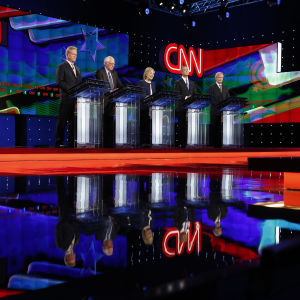A pattern begins to emerge after one Democratic and two Republican presidential debates. The Democrats will minimize each other’s flaws and the Republicans will shine a bright light on theirs. Republicans will brawl while Democrats revel in unseemly deference.
Hillary Clinton has little to fear from appearing center stage surrounded by four eunuchs, even from former Maryland Gov. Martin O’Malley, famous for telling a critical Baltimore radio host, “Come outside after the show and I’ll kick your ass.” There’ll be no glimpses of that disputatious O’Malley in the Democratic contest.
Socialist Bernie Sanders, Clinton’s only serious rival, may want to holler away her email troubles in exchange for some applause from the partisan audience, but much of America is curious to see the 5.0 version of the emerging controversy.
Deference from Democrats may take some heat off Clinton in the short run but it caused her to leave a lot of hostages on the battlefield for Republicans to parade in next fall’s main event. A proper debate would have had the socialist and other Democrats deriding the former secretary of state’s choice of Libya as an example of sound American foreign policy.
Libya? Clinton dismissed the mess left in the wake of the 2011 attacks on Libya with “because of a lot of other things, there was turmoil to be followed.” Still, she maintains that Libya is an example of American smart power. On a crowded Republican stage, no candidate would get away with explaining a fiasco by waving it off with a “things happened” defense.
The Republican debates have been messy, rollicking affairs. They have tested the candidates. Some have been found wanting, others made shrewd use of their opportunities to show what they’ve got to enormous audiences. The most prominent casualty has been Wisconsin Governor Scott Walker, long considered a top tier contender, he melted under the intense heat of a crowded national debate.
Walker seemed to shrink with exposure to the bright lights. That’s what good debates do. Carly Fiorina, on the other hand, blossomed into a presence if not yet a fully-rounded force. Debates do that too. They launch, and they also eliminate. Sometimes they sustain, more an endurance test than anything else. The effects can be subtle. Former Florida Gov. Jeb Bush, for example, mustered two performances that ranged from unsatisfactory to undistinguished. His fundraising is off and, worse, his poll numbers are often in low single digits, an extraordinary reversal of fortune. The debates provided Bush with an opportunity to reveal a more dynamic persona than he has seen. It’s still waiting.
The tone of the Republican debates has been markedly different than this month’s first Democratic one from the start. That brings us to Donald Trump. At the August 5th first Republican debate in Cleveland, Fox’s Megyn Kelly made an impression with her first question of the night to Trump that began, “You’ve called women you don’t like, ‘fat pigs,’ ‘dogs,’ ‘slobs,’ and ‘disgusting animals.’” Not your usual debate fare, but it provided the essential strokes in painting Trump’s portrait. Remarkably, many seemed to like what they saw in the unspeakable real estate bloviator.
Imagine how much more revealing the Democratic debate would have been if CNN’s Anderson Cooper had reminded Hillary Clinton of her recent statement that women who say they have been sexually assaulted should be believed. Then he could have asked if that standard ought to have been applied to Juanita Broaddrick, Paula Jones, and Kathleen Willey, her husband’s most famous accusers. Cooper could have thrown in a quote from Secretary Clinton’s jocular description of a 1975 criminal case in which she won a lenient sentence for a 41 year old factory worker accused of raping a 12-year-old girl.
We may hear excerpts from that unsettling 1980s interview in independent expenditure advertisement as the campaign progresses. It would have been instructive to see how Clinton responded to it on the Las Vegas stage–and to test the limits of her four toothless opponents’ deference.
In the long run, it does candidates no harm to let them pass through the early debates with polite exchanges. These events are important filters, tests of who’s built to move to the next round. Raucous Republicans have served that purpose better than demur Democrats.

